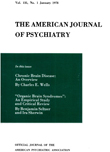Depersonalization, Dysphoria, and Thought Disturbance
Abstract
In a previous study the authors demonstrated a significant association between depersonalization and anxiety; in the present one they replicate this finding with an additional 155 patients and also delineate the close association of depersonalization with dysphoric affect and specific types of pathological thinking. From these data it appears that the patient who experiences depersonalization is a person with chronic anxiety, persistent depressive affect, and some degree of psychopathological thinking. It is hypothesized that depersonalization may then be the perceived feeling or experiential state of the person who has this constellation of symptoms.
Access content
To read the fulltext, please use one of the options below to sign in or purchase access.- Personal login
- Institutional Login
- Sign in via OpenAthens
- Register for access
-
Please login/register if you wish to pair your device and check access availability.
Not a subscriber?
PsychiatryOnline subscription options offer access to the DSM-5 library, books, journals, CME, and patient resources. This all-in-one virtual library provides psychiatrists and mental health professionals with key resources for diagnosis, treatment, research, and professional development.
Need more help? PsychiatryOnline Customer Service may be reached by emailing [email protected] or by calling 800-368-5777 (in the U.S.) or 703-907-7322 (outside the U.S.).



